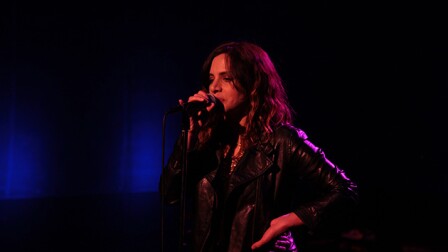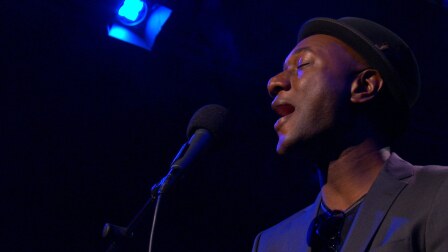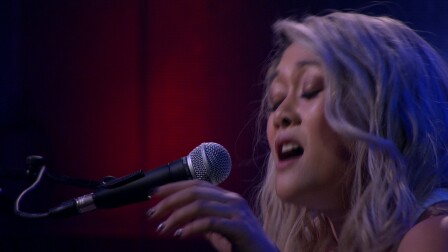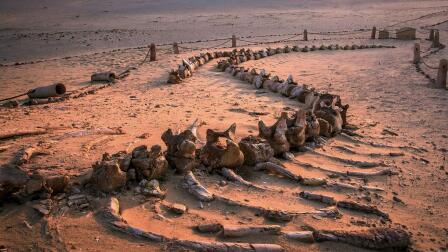
First Person: Nick Waterhouse
Nick Waterhouse brings his buttoned-up, soulful rock to "Artbound Presents Studio A." Backed by a horn-section and backup vocalists, Waterhouse creates vintage-inspired music that spans decades, from the doo-wop era to the golden age of AM radio. Watch his performance airing on February 17 and February 20 at 9PM PST on KCET-TV.
Discover more about Nick Waterhouse in his own words.
On his upbringing
I was born in Santa Ana and my father was a fireman there and in Anaheim. I spent a lot of my childhood around there and also in Long Beach where we had a real small sail boat. My parents bought a house when I was four in Huntington Beach so I grew up in Huntington Beach. I was right on the border of Costa Mesa; I spent a lot of time around there when I got to be a teenager. My dad was a fireman and my mom was a saleswoman in Los Angeles. She drove around a lot. I had a lot of alone time, I would be the first kid dropped off at morning day care and the last kid picked up at night. I drew a lot and read a lot, I started reading at a really early age and I was obsessed with music. I was just a solitary kid.
On his musical exposure as a youth
I don't like most of what I heard then. It was Alternative Rock Radio and Power 106. Just being aware that there is another world. None of that really emotionally affected me though the way that some other stuff did the more I spent time actually paying attention. I was really interested in figuring out what was visceral, what things made me feel kind of funny. It ended up being a lot of British invasion records and blues... John Lee Hooker. Those were all things that were right in front of my face but I wasn't playing close attention to them. I just listened to everything, I heard everything from Weezer to Dr. Dre in my childhood. It doesn't mean that I was seeking it out though.
On his identification with visceral music
When I was in middle school I remember people started to define themselves based on what their tastes was and I felt pressured to be involved based on my personality with a group of people that were into one sound and in reality I didn't really identify with that world too much. So I started to seek something that was really true to me and that turned out to be stuff like "Here Comes The Night" by Them, which I would hear my whole life. I talked about it before, just the power and the energy of that stuff seemed a lot more pure and visceral than Punk Rock or Gangster Rap or whatever little kids are listening to try to shock their parents. I had started playing guitar by then, it all coincided with playing music too.

On the difference between music and other art
I didn't think of any of these things in terms of emulation because when you are a kid and you have a developing brain ... the problem is music and the way that people think about music nowadays is totally different than most other art forms. It is like by nature everyone presumes imitation as derivative whereas in architecture or literature or film everybody goes through form by looking at other people. The great thing about being the person doing it is that you are not looking at things in the way that you just uttered. Instead, you are just like "I want to figure this out", that's all it is and you get really, your circumstances dictate what it is truly that your heart is set on. Because the thing you spend the most amount of time on you did not choose that it choose you.
On working at a San Francisco record store
The store was like when you read about the lost generation what Gertrude Stein's house was. It was a huge clearinghouse for people exchanging ideas and information and from there you go to other things. If you are at the store all day you get your night time plans from being at the shop. You would run across DJ's where people who were going to these dances or clubs that were being put on and you would find out about these and you would get exposed to a bunch of really unique personalities that way, it's like Jane Jacobs fantasy of how a city is supposed to work. You have this disparate gang of people that all interact with each other because they are hitting this hub and that's more what the shop was like, because I work there and I was the kid. I had boundless energy and I didn't drink and I had a fake ID so I was at every single night all night long just digging it, taking in all the music, being around, talking to people, telling people what's going on in the shop, what records showed up, talking to other people about what other nights there were. There was a whole fascinating scene around that shop at the time. And on top of that there was the fact that Dick who owned the record shop, Dick Vivian is a music enthusiast, he is not a gatekeeper like record store owners can be. He doesn't intimidate and he doesn't bully and he wants everybody to enjoy it and feel it the way he does. He doesn't keep things in plastic wrappers and he doesn't tell you not to touch anything and that makes for a really amazing environment for a lot of young people to hang around in if they want to enjoy music.
On his musical exposure in San Francisco
I think that I was unique in that I was concerned with how things were recorded. I was listening as a musician but I was not a musician and so I was around a lot of DJ's and people who explicitly enjoyed these sorts of I guess its untapped American resources. It's whole catalogues that are forgotten and artists and songs that are forgotten and so when you hear those things it hits you upside the head. It's like finding out about a third world besides what you heard on the radio and what quote on quote independent music in America was supposed to be contemporary. So people who liked Animal Collective and Arcade Fire were the outsiders, this music is even more outside of that. For me it was about learning, you would encounter one person who kind of had a specialty and they had their whole catalogue of what they liked and what they could play and DJ well. So you would learn all about girl groups from that person. So you get switched on to all these records that you would have never ever heard if you hadn't gotten in contact with that person and then also hear those in the context of an amazing DJ night, making people dance because that's what the point of DJing. If you are a bad DJ you are indulgent and you just play a bunch of records you like, the crowd is bored and you get fired from your job. Conversely, if you pay attention and listen like a musician, which is what I started doing I kind of, had a perspective that was different than people who were a girl group collectors. I was listening more to how players were playing on those records or how rooms sounded or who produced what or reading the fine print. That kind of stuff seemed really natural to me, I wasn't going out of my way to try to figure anything out I was just so fascinated and fixated like any artist who just kind of spent a lot of time working, you process a lot of things in order to get to a point. I didn't realize that I was processing till I get to making my own work.

On the roots of his record "Time's All Gone"
I made the record down here in Costa Mesa with people from here that are friends of mine and it was literally done in a day. I was down from San Francisco for a weekend and so in a way I felt like my work represented the fact that I saw no divide. I just considered California one big place; it was no big deal for me to move between those two cities. I made the record there, I went back to San Francisco, I sold the record to a bunch of independent retailers basically out of the trunk of a car and sold them out of the shop, rookies. Then DJ's started playing it and then it picked up really big in this sort of collectible European soul scene. For lack of better terms, I don't like that label but because of that I started getting demands to play shows and I had no intention of having a band and a myriad of situations led to me sort of accidentally assembling this band of people in San Francisco. It was like the record became the magnet to draw all these people to me and suddenly take me seriously as an artist, it was like I had to convince them and that was my calling card. I did almost all the work of "Time's All Gone" in San Francisco and worked a lot of that out with the group that I had assembled up there and then brought them back down to Southern California and cut it and then I moved to Los Angeles maybe a year later. When things started to get serious and I lost my job because I was taking too much time off to play shows. It became apparent that I was really doing it. I needed to split; I had to get out of town. I had gone through a really rough break up and things were changing really severely in the city it was getting really expensive, people were going away, a lot of the places I used to hang around at were closing down because of this sudden influx of Web 2.0 I don't know for lack of better terms.
On the recording process of "Time's All Gone"
When I started, I had this psychology of writing for a 45. I think all my songs, because I listen to so many 45's were write what you know and that involved thinking in terms of that, not trying to right an album and so "Time's All Gone" was cut in three bulk sessions which were basically two or three days and were definitely under the gun. Almost all of it was self-financed until I ran out of money and then I had to sign to a label.
On the technical aspects of the record
There is a famous quote by Leiber and Stoller where they were talking about what their jobs were, they were songwriters and producers and they said " we don't make songs we make records" and that always stuck with me. That to me was about controlling everything from conception all the way to finished product because I saw so many things that seemed like watered down versions of something that did not really move me. People would ask me "do you like this or that and it's like no, there is a lot of things missing there." My rationale when I made "Some Place" was to trick myself into making something by lowering the expectation of what a project was. A 45' is not an undertaking like recording an album and honestly the way that 45's were made, I spent my teenage years around that culture in parallel to my interest in music I also happened to come into this studio called The Distillery in Costa Mesa that was ten blocks from my parents' house that was all analog. Mike McHugh was the engineer and the owner and he ran it and he was explicitly anti-computer in recording and used a lot of tube and transistor electronics and that was the only education I had of recording, there was nothing else. So I knew that and I knew records that I liked the sound of and it just so happened that the more I learned about the records that I like the sound of the more I understood that the technology I was exposed to was the kind that made those records. To me it was about messing with the program. I didn't go way out of my way to figure out some other way to make stuff. I think some people have a misconception about that but the reality is I got stupid lucky by meeting Mike and just by fate I ended up in there a year later.

On analog recording
When you go analog, you have to be more involved. We live in a time where people are so good at skimming and fixing things in post, in the recording world, fixing things in post is sort of using Wikipedia to look up information on your smart phone. Your knowledge is purely circumstantial. My dad raised me with this notion of measure twice cut once. Or if you are gonna do something do it right. The notion of being well rehearsed and using everything as a good setup instead of relying on fixing everything, it seems silly to me. I don't know the other thing was the pure living breathing aspect of equipment, it's really strange to say that and I know that it's not good to become attached or fixated or romanticize those sorts of things but honestly some really magical things happen in a studio when all things go right at once that I have never witnessed later on when I have been exposed to digital equipment or have heard digital recordings and that was just my personal experience.
On his audience
I had these two worlds that were suddenly really interested in me. Tumblr did a write-up on me but then all these northern soul collectors who traded through the mail were going insane and buying. So I was having all these orders of people who heard about me on Tumblr and then all these people that were hard core old school record collectors and to me that sums up where I sit. I don't mind media as a tool and by media I mean technology, the internet , but I don't fit in with them and I don't mind record collector culture but I don't necessarily fit in with them either. I think in the end what sells my records to both of those people is the honesty and that's what I felt like I was really getting across when I was doing it the way I was doing it at The Distillery.
On Film Noir's influence to his art
I saw Chinatown when I was sixteen and that was one of the most important days of my life. I still remember the drive home from it. What knocked me out was this expression of sort of a larger fate and these gray areas and these Shakespearean elements that occur in all of these that I saw echoes of in a lot of other art that I was forced to study but it seemed really relevant to me. So I grew up with Chandler and with watching "Out of the Past" and "Criss-Cross" and all these great films that I felt in a weird way they had echoes of other things in them that I saw in some of the music that I liked. Whether it is minor key Latin-tinged stuff. To me some of that stuff sounds like those films and also the fiction I was reading as a youth. As I grew older I loved the way that there were gray areas in all that work and I felt like that's a big part of my voice. In my work I am expressing myself through a patchwork of all my influences right and hopefully I am saying something new through that, the same way that a lot of the poets I grew up reading like Hart Crane or Frank O'Hara or T.S Eliot like all those guys are referencing other things too and they are using those to set an atmosphere and state something else and I think that I am aware of that and again not when I am making things.

On the difference between his records "Holly" and "Time's All Gone"
I recognized "Time's All Gone" as a San Francisco record for me, in that the sound of it and the lyrical content of it was a lot of my life up there. It's about people that I was around there and it's a love story that doesn't really work out. When I got to Holly things became more interesting because I found myself writing these songs that were maybe less about I and more about everyone else to the extent that's greater than "Time's All Gone." I found myself relating to this sort of Los Angeles that I ended up in. I wrote Holly and I wanted to talk about a certain kind of person that I was encountering around Echo Park and Highland Park and I don't really like being very overt about these sorts of things but it was kind of a cultural observation tune and it made a lot of sense to me the way that I phrase things it becomes a little bit more universal or abstract. I found the more I was assembling the record the more sense it was starting to make in that it was turning into a Los Angeles record.
On the social influences of his song "Holly"
I was spending time around "gentrifiers" for lack of better terms and I recognized that in my generation as a definite accelerated trend. How people almost like the danger of it, it's fun for them or it gives them credibility or it's exciting and it's about this disconnect and lack of responsibility maybe. That song about drunk driving and shootings and the people who go to bars between them. I don't know why I liked that notion so much but it just made sense to me.
On his musicians
I have a lot of different people but a lot of these guys have been on the road with me the last year. Brittany Manor one of the singers is always on tour with me. Carol Hatchett sometimes does shows, Lee Pardini sometimes does it. I have an East Coast guy too. I have an East Coast drummer. Rob Douglass the bass player I use mostly. Ron Dziubla the horn player I use in LA and California only. Andres Renteria on congas I play with him a lot too. I started to write stuff around Latin percussion about a year in a half ago so I really wanted him on my stuff and it is always a struggle, he does most of the shows.









